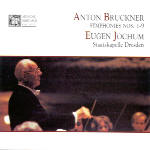This latest remastering of Eugen Jochum’s celebrated Bruckner cycle with the Staatskapelle Dresden has significantly improved sound with greater clarity and presence, especially in the first two movements of Symphony No. 8 (which were inexplicably recorded far more dimly than the remaining two). Jochum was a Bruckner conductor par excellence, and he identified with these symphonies more closely than most, if not all, other performers–so much so that his interpretive choices seem instinctual, giving the music an improvisatory feel. The headlong acceleration at the end of Symphony No. 1’s first movement, the swelling of the held note in the main theme of the Fifth Symphony, or the rapid tempos in the Ninth’s first movement development, and the brazenly loud horn call at the close of that movement’s recapitulation are just a few of the most telling examples.
Jochum’s preferred tempos tended to the quick, eschewing the meditative style of Bruckner performance (except of course when it came to those marvelous adagios, where he created an effect close to rapture). Throughout the set the Dresden orchestra plays magnificently, with the brass producing a craggy yet richly warm sonority that lends a stark grandeur to the performances (especially in moments like the climax of the Seventh’s adagio). In fact, these versions generally improve on the same conductor’s earlier cycle for Deutsche Grammophon, with perhaps the exception of the Fourth Symphony.
Jochum was committed to the Nowak texts, which means unfortunate cuts in the Second and Eighth symphonies, but so majestic is his sweep and bold his projection that Haas devotees will be willing to supplement with alternate recordings of those editions just to enjoy this magnificent set–a solution that MHS’s price makes utterly practical.
































